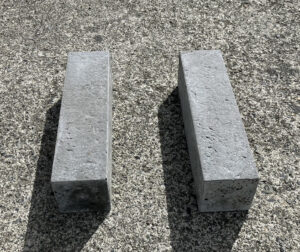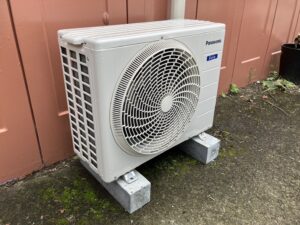― Contributing to Further Reduction of CO₂ Emissions During Manufacturing Through Effective Utilization of Hydrogen Production Byproducts ―
Hydrogen Technology Inc. (President: Yasuhiro Yamamoto, hereinafter “Hydrogen”) has adopted “CEMENON®” for the first time in its own construction projects. It involves using “low-emission water glass,” a byproduct obtained from Hydrogen’s hydrogen production process, as part of the material in unreinforced concrete blocks.
*CEMENON® is a geopolymer concrete jointly developed by IKK Corporation (“IKK”, formerly IHI Construction Service Co., Ltd., President: Susumu Ishihara), ADVAN ENG. Co., ltd. (“ADVAN”, President: Tatsutoshi Matsui), IHI Corporation (“IHI”, President: Hiroshi Ide), and Yokohama National University(“YNU”).
By replacing part of the alkali material in CEMENON® with low-emission water glass, a byproduct of our hydrogen production process, we have significantly reduced CO₂ emissions, paving the way for a more sustainable future.
■ Background
Cement, a primary raw material for concrete, is an essential material supporting social infrastructure. However, its production involves significant CO₂ emissions. Notably, non-energy-related CO₂ emissions from cement manufacturing account for approximately 8% of global total emissions, making reductions in this sector a global challenge for achieving carbon neutrality.Under the circumstances, cement-free geopolymer concrete has gained attention as a potential alternative material capable of reducing CO₂ emissions during production.
However, the “water glass” widely used as a geopolymer setting agent can sometimes pose environmental challenges due to its manufacturing process, necessitating the development of more suitable raw materials and production methods.
To address these challenges, Hydrogen has focused on water glass produced as a byproduct in its own hydrogen manufacturing process, exploring its potential for effective utilization as a resource.
Now, by utilizing this byproduct as “environmentally friendly water glass,” we have further enhanced the environmental performance of “CEMENON®.”
By adopting Hydrogen’s “Environmentally Friendly Water Glass,” we have achieved a 15% reduction in CO₂ emissions compared to the current formulation.

Unreinforced Concrete Block (Manufactured using “CEMENON®” incorporating the byproduct “low-emission water glass”)

Construction Work
■ Key Points
- First application of Hydrogen’s “low-emission water glass” in geopolymer concrete “CEMENON®”.
- By utilizing byproducts as resources, we achieve a water glass supply with reduced CO₂ emissions.
- It is also effective from the perspective of waste reduction and resource recycling (circular economy).
- Contributes to the decarbonization and green procurement trends in the construction field, as well as the realization of a carbon-neutral and hydrogen society by 2050.
■ Terminology Notes
- Geopolymer: An inorganic binding material produced by chemically reacting (polymerizing) a powder primarily composed of aluminosilicate with an alkaline solution. Unlike Portland cement, which is manufactured by calcining limestone at high temperatures, it does not require a high-temperature calcination process for its raw materials. It can utilize industrial byproducts such as fly ash and blast furnace slag fine powder as raw materials. It also excels in fire resistance and acid resistance. In recent years, its use has expanded across various fields, including building materials, infrastructure repair, fire-resistant structures, and even waste containment applications.
- This announcement from Hydrogen concerns the adoption of low-emission water glass for “CEMENON®”. The primary entities developing and manufacturing “CEMENON®” are IKK, ADVAN, IHI, and YNU.
- Regarding the term “low-emission”: This expression is based on the raw material’s origin from a byproduct perspective and on our internal evaluation. Results may vary depending on calculation assumptions and scope.
Inquiries regarding this matter
Hydrogen Technology Inc.
E-mail: press@eh-tech.co.jp
